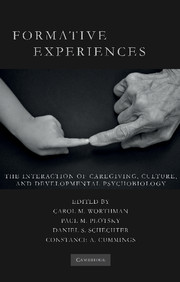Book contents
- Frontmatter
- Contents
- List of Figures
- List of Tables
- List of Contributors
- Foreword by Robert Sapolsky
- Preface
- List of Abbreviations
- Introduction
- SECTION ONE HISTORICAL, CROSS-CULTURAL, AND DEVELOPMENTAL SCIENCE PERSPECTIVES
- SECTION TWO HOW EXPERIENCE INTERACTS WITH BIOLOGICAL DEVELOPMENT
- 3 The Social Environment and the Epigenome
- 4 Sensitive Periods in the Behavioral Development of Mammals
- 5 Confluence of Individual and Caregiver Influences on Socioemotional Development in Typical and Atypical Populations
- 6 We Are Social – Therefore We Are: The Interplay of Mind, Culture, and Genetics in Williams Syndrome
- SECTION THREE FORMATIVE RELATIONSHIPS WITHIN AND ACROSS GENERATIONS
- SECTION FOUR SOCIAL AND CULTURAL CONTEXTS OF CHILDHOOD DEVELOPMENT – NORMATIVE SETTINGS, PRACTICES, AND CONSEQUENCES
- SECTION FIVE FEAR, FUN, AND THE BOUNDARIES OF SOCIAL EXPERIENCE
- SECTION SIX PUBLIC HEALTH, EDUCATION, AND POLICY IMPLICATIONS
- Index
- References
4 - Sensitive Periods in the Behavioral Development of Mammals
Published online by Cambridge University Press: 26 May 2010
- Frontmatter
- Contents
- List of Figures
- List of Tables
- List of Contributors
- Foreword by Robert Sapolsky
- Preface
- List of Abbreviations
- Introduction
- SECTION ONE HISTORICAL, CROSS-CULTURAL, AND DEVELOPMENTAL SCIENCE PERSPECTIVES
- SECTION TWO HOW EXPERIENCE INTERACTS WITH BIOLOGICAL DEVELOPMENT
- 3 The Social Environment and the Epigenome
- 4 Sensitive Periods in the Behavioral Development of Mammals
- 5 Confluence of Individual and Caregiver Influences on Socioemotional Development in Typical and Atypical Populations
- 6 We Are Social – Therefore We Are: The Interplay of Mind, Culture, and Genetics in Williams Syndrome
- SECTION THREE FORMATIVE RELATIONSHIPS WITHIN AND ACROSS GENERATIONS
- SECTION FOUR SOCIAL AND CULTURAL CONTEXTS OF CHILDHOOD DEVELOPMENT – NORMATIVE SETTINGS, PRACTICES, AND CONSEQUENCES
- SECTION FIVE FEAR, FUN, AND THE BOUNDARIES OF SOCIAL EXPERIENCE
- SECTION SIX PUBLIC HEALTH, EDUCATION, AND POLICY IMPLICATIONS
- Index
- References
Summary
Experience can modify the behavior of animals anytime during their lifespan. Sometimes an experience is so powerful that it can alter the animal's behavior in an enduring way. It has been argued that environmental influences are particularly effective in shaping behavior when they occur in early development. This view implies that early experience differs from experience in adulthood. In other words, there are specific periods during development, windows of susceptibility, when experience has a significantly stronger impact on brain and behavior compared to other periods. In this review, I will try to answer the question, “Do particular periods exist in the early lives of mammals during which experience has long-lasting consequences in brain and behavior?” I will first describe the concept of sensitive periods, and then summarize studies that demonstrate an effect of early experience on later behavior. Examples include olfactory learning about the caregiver and the consequences of aversive stimulation on anxiety and fear. I will discuss the neural bases of experience-dependent changes in behavior during sensitive periods, and suggest, finally, that whereas early experience can result in adaptive adjustments to local environments, it can also lead to disruption and maladaptation.
THE CONCEPT OF SENSITIVE PERIOD
The idea that experience has a more pronounced and a longer lasting effect during early development than later in life has a long history. The ethologist Konrad Lorenz introduced the concept of “critical period” into the behavioral sciences (Lorenz, 1937).
- Type
- Chapter
- Information
- Formative ExperiencesThe Interaction of Caregiving, Culture, and Developmental Psychobiology, pp. 82 - 105Publisher: Cambridge University PressPrint publication year: 2010
References
- 2
- Cited by

